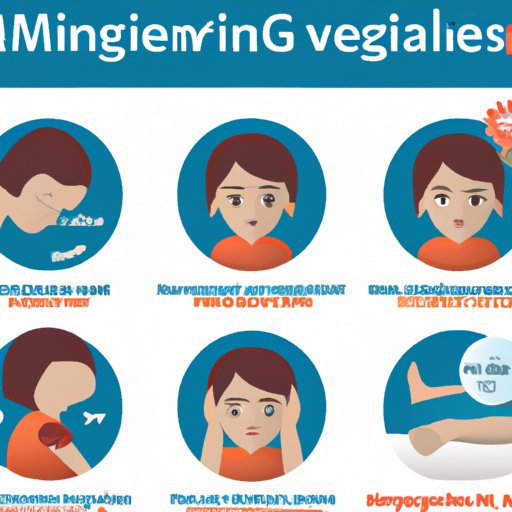
Introduction
Viral meningitis is a serious condition that affects the protective membranes surrounding the brain and spinal cord. It is often caused by a viral infection and can lead to severe health complications if left untreated. In this article, we will discuss the causes, symptoms, prevention, treatment, and recovery of viral meningitis. It is important to understand the dangers of this condition and how to protect yourself and others from the virus.
Detailing the Symptoms
Viral meningitis presents with a variety of symptoms that include severe headache, high fever, neck stiffness, sensitivity to light, nausea, and vomiting. In addition, people with viral meningitis may experience confusion, difficulty concentrating, and decreased appetite. These symptoms usually develop within three to seven days after exposure to the virus. It is essential to recognize these symptoms early and seek immediate medical care.
Causes and Risk Factors
Viral meningitis is usually caused by enteroviruses, which are common in the summer and fall seasons. Other viruses that can cause meningitis include herpes simplex virus, West Nile virus, and mumps virus. People with weakened immune systems are more vulnerable to viral meningitis. Infants, young children, and the elderly are also more susceptible to the virus. Exposure to an infected person through coughing, sneezing, or sharing utensils can also increase the risk of contracting the virus. Simple preventative measures can help reduce the likelihood of infection.
Prevention
The best way to prevent viral meningitis is by practicing good hygiene habits, like washing your hands regularly and avoiding close contact with sick people. It is imperative to cover your mouth and nose while coughing and sneezing to prevent the spreading of the virus. Additionally, individuals should avoid sharing their utensils or drinks with others. Lastly, get vaccinated against preventable illnesses like measles and mumps.
Treatment and Recovery
If someone is diagnosed with viral meningitis, the treatment plan will depend on the severity of the condition. Most cases of viral meningitis can be treated at home with symptom-relieving medication, plenty of rest, and fluids. However, some severe cases may require hospitalization, with treatment involving antiviral medications, and in severe cases, intravenous antibiotics. It is crucial to follow the recommended treatment plan to avoid any complications and manage symptoms adequately. Part of the recovery process may also include rehabilitation to help the affected person regain their strength.
Personal Story
Imagine feeling terrible while experiencing debilitating headaches, only to find out that you have viral meningitis. Suddenly, your daily routine changes, and all you can do is rest, recover, and take it easy. For Annabelle, a college student, that’s exactly what happened. She described the experience as being unexplainably painful, as the headaches were so severe that it was hard to bear. After being hospitalized, Annabelle was on antibiotics for weeks, with her recovery period lasting for several months. The experience was an eye-opener for her, and she takes any symptoms seriously, understanding the potential risks of not seeking medical attention.
Conclusion
Viral meningitis is a serious illness that should not be taken lightly. Understanding the symptoms and preventative measures that can be taken is critical to reduce the risk of infection. By following the recommended guidelines for your health and safety, you can help prevent viral meningitis from spreading and protect yourself and those around you. It is necessary to seek medical attention if you experience any symptoms, as timely treatment can make all the difference in your recovery.




